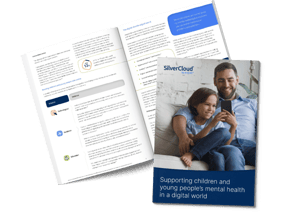A staggering one in six 7 to 16-year-olds and one in four 17 to 19-year-olds have a probable mental disorder right now, according to a recent report from NHS Digital. This is a sharp increase from a few years ago, with the report finding only 10% (one in 10) of young people in 2017 were suspected of having a mental disorder.
Alongside the rising prevalence, children and teens are typically presenting with more complex or severe needs, and many young people face barriers in accessing support. As highlighted in a recent whitepaper from SilverCloud® by Amwell®, Supporting Children and Young People in a Digital World, traditional support systems have had to adapt, utilising new ways to meet demand. For many, digital interventions are playing a critical role in helping to reshape delivery and improve access to support.
To take a closer look at how one youth mental health service is evolving, we spoke with expert Lynsey Eland, Children and Young People’s Service Manager at Carlisle Eden Mind.
We know young people have experienced many challenges in recent years, leading to an increasing number needing support. Do you think any other factors are playing a role in the increased demand?
“I think a real difficulty, is stemming from how young people are aware of everyday emotions and how to handle them. While there’s quite rightly been a push for a kinder society that is more mentally aware, young people now have an influx of information around mental health, and we may often end up over- medicalising feelings. When they experience challenging emotions, there could be the tendency to jump to a mental health diagnosis and the need of a professional, rather than perhaps understanding some experiences are in the normal and typical realms of how we might feel.
“It’s well understood that when you have a diagnosis, you usually need some level of professional help. But even with this, it still comes down to how an individual makes decisions and choices. I think when young people start to feel uncomfortable, rather than saying, ‘Ok, I’m not feeling good, let me try these tips to support and educate myself’, they might be self-diagnosing a mental health condition and feeling like they need to wait for professional support. That’s a really disempowering feeling.”
How is your service working to address this and support young people?
“Working with both individuals and the wider community such as schools, we focus on education. We teach young people how to understand their emotions and what the normal realms are, and equip them with the resources and learning to facilitate good mental health. We’re also gently honest and realistic about what services provide. Young people may be waiting for specialist treatment for several months, and even when they reach services, support is limited. We try to ensure young people feel empowered to help themselves, whatever stage they’re at.”
Our recent whitepaper Supporting Children and Young People in a Digital World highlighted the important role parents and carers can play in helping children manage their mental health. Is this an important part of your service?
“Parental support can often be really low on the ground, but it’s incredibly important. You can do amazing work with a child, but if they are going home to parents who didn’t understand, were unable to support or find available services, or didn’t know how or feel confident supporting their child, that young person is much less likely to progress. It’s important for us to make sure we offer parents support, so they feel able to create a positive mental health environment and be there for their child, whether they're waiting to progress through the system or not.”
|
|
We know that demand for mental health services is increasing, but support capacity is limited, which is leaving many young people on waiting lists for months. How has your service delivery changed as a result of this increased demand?
“The service delivery chain got blocked all the time. We needed something else that could still support all these young people where traditional services couldn’t. During Covid-19 we looked towards digital solutions as a way of being able to improve access to support. Being able to offer something digitally alongside our service or when people were waiting, meant we always had support available in some capacity, whether it be for young people or parents. After trying several digital tools, I turned to the SilverCloud® platform. I really liked the language, content and design used, and felt it would resonate with our service users.”
How are you using SilverCloud® programmes as part of your support offering?
“We use the SilverCloud® platform in a supported capacity, meaning when young people are referred to us, they know they will be working on the platform with the support of a professional from CE Mind. We regularly check in on a young person’s SilverCloud platform, looking at their engagement and how they’re getting on with activities, journaling, and different parts of the programme. From this we can then suggest coaching tips and provide personalised encouragement, as well as signposting to clinically proven resources on the platform. We’ve also implemented the platform in an unsupported way to older students who can access it independently.
“We are also using the platform to support parents. The parent programme is a key reason we came to the SilverCloud platform. Parents receive advice and resources for supporting their child, helping them feel more resilient, and allowing them to best support their child. What’s great is that parents can self-refer to this service, meaning even if our service doesn’t have capacity to work with their child straight away, parents can still get guidance on how to support their child’s mental health.”
Now that you’ve been working with the SilverCloud platform for some time, what have you learned about digital service delivery?
“It’s integral the team provides a personalised service through the SilverCloud® platform, tailoring to what each individual needs and bringing up personal elements of the young person’s work and life. It’s also important to remember that each individual has varying needs and suitability for digital. Some will fully engage, some will show up but won’t reply, and some may not use the tool at all.”
|
|
At SilverCloud® by Amwell® we can support healthcare organisations to scale access to mental health support. Backed by 20 years of research and digital innovation, we offer clinically proven and impactful methods to meet the diverse needs of patients, continue delivering a high level of care, and reduce pressure on services.
Learn more about the SilverCloud® platform for healthcare organisations here.








 Find out more about how digital is supporting the mental health of children and young people in our new whitepaper
Find out more about how digital is supporting the mental health of children and young people in our new whitepaper
